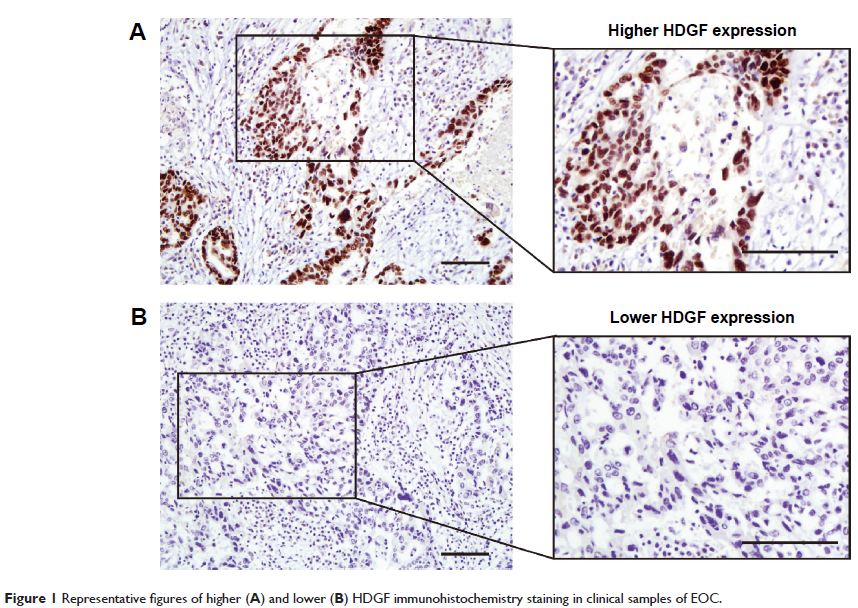109669
论文已发表
注册即可获取德孚的最新动态
IF 收录期刊
- 3.4 Breast Cancer (Dove Med Press)
- 3.2 Clin Epidemiol
- 2.6 Cancer Manag Res
- 2.9 Infect Drug Resist
- 3.7 Clin Interv Aging
- 5.1 Drug Des Dev Ther
- 3.1 Int J Chronic Obstr
- 6.6 Int J Nanomed
- 2.6 Int J Women's Health
- 2.9 Neuropsych Dis Treat
- 2.8 OncoTargets Ther
- 2.0 Patient Prefer Adher
- 2.2 Ther Clin Risk Manag
- 2.5 J Pain Res
- 3.0 Diabet Metab Synd Ob
- 3.2 Psychol Res Behav Ma
- 3.4 Nat Sci Sleep
- 1.8 Pharmgenomics Pers Med
- 2.0 Risk Manag Healthc Policy
- 4.1 J Inflamm Res
- 2.0 Int J Gen Med
- 3.4 J Hepatocell Carcinoma
- 3.0 J Asthma Allergy
- 2.2 Clin Cosmet Investig Dermatol
- 2.4 J Multidiscip Healthc

已发表论文
肝癌衍生生长因子预测了卵巢上皮癌的预后不良
Authors Liu XJ, Liu WL, Yang FM, Yang XQ, Lu XF
Received 29 March 2015
Accepted for publication 19 May 2015
Published 13 August 2015 Volume 2015:8 Pages 2101—2109
DOI http://dx.doi.org/10.2147/OTT.S85660
Checked for plagiarism Yes
Review by Single-blind
Peer reviewer comments 3
Editor who approved publication: Dr Faris Farassati
Aim: To evaluate the expression and clinical significance of hepatoma-derived growth factor (HDGF) in epithelial ovarian cancer (EOC).
Background: Recent studies have demonstrated that HDGF overexpression correlates to the progression and poor prognosis in several kinds of cancers. However, the clinical significance and prognostic value of HDGF in EOC have not been investigated.
Methods: Expression of HDGF was visualized by immunohistology and then the cohort was divided into higher- and lower-expression groups. The correlation between HDGF and clinicopathologic factors was analyzed by χ 2 test. The prognostic value of HDGF was assessed by univariate analysis with Kaplan–Meier method, and by multivariate analysis with Cox-regression model. With experiments in vitro, HDGF expression in ovarian cancer cell lines was detected by immunoblotting.
Results: Higher HDGF expression rate was 52.76% in EOC. HDGF expression was significantly associated with lymphatic metastasis (P =0.006). Higher HDGF expression was closely correlated to poorer 5-year overall survival rate with univariate analysis (P =0.003), and was identified as an independent prognostic factor with multivariate analysis (P =0.007). With experiments in vitro, HDGF was proved to exist in all ovarian cancer cell lines with different expression levels.
Conclusion: HDGF expression correlates to unfavorable prognosis and can be considered as an independent prognostic factor, indicating that HDGF may be a promising potential molecular drug target.
Keywords: biomarker, HDGF, knockdown, invasion
Background: Recent studies have demonstrated that HDGF overexpression correlates to the progression and poor prognosis in several kinds of cancers. However, the clinical significance and prognostic value of HDGF in EOC have not been investigated.
Methods: Expression of HDGF was visualized by immunohistology and then the cohort was divided into higher- and lower-expression groups. The correlation between HDGF and clinicopathologic factors was analyzed by χ 2 test. The prognostic value of HDGF was assessed by univariate analysis with Kaplan–Meier method, and by multivariate analysis with Cox-regression model. With experiments in vitro, HDGF expression in ovarian cancer cell lines was detected by immunoblotting.
Results: Higher HDGF expression rate was 52.76% in EOC. HDGF expression was significantly associated with lymphatic metastasis (P =0.006). Higher HDGF expression was closely correlated to poorer 5-year overall survival rate with univariate analysis (P =0.003), and was identified as an independent prognostic factor with multivariate analysis (P =0.007). With experiments in vitro, HDGF was proved to exist in all ovarian cancer cell lines with different expression levels.
Conclusion: HDGF expression correlates to unfavorable prognosis and can be considered as an independent prognostic factor, indicating that HDGF may be a promising potential molecular drug target.
Keywords: biomarker, HDGF, knockdown, invasion
